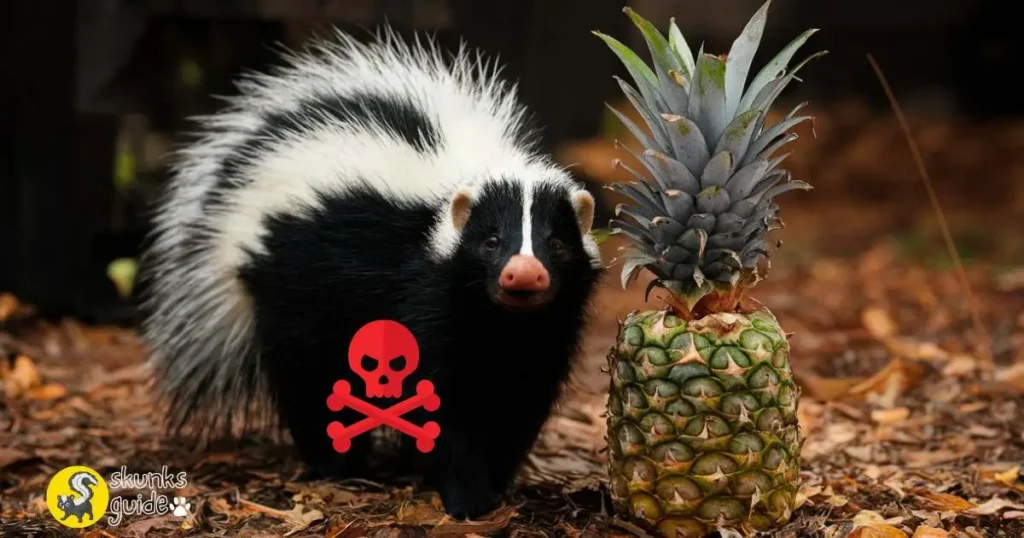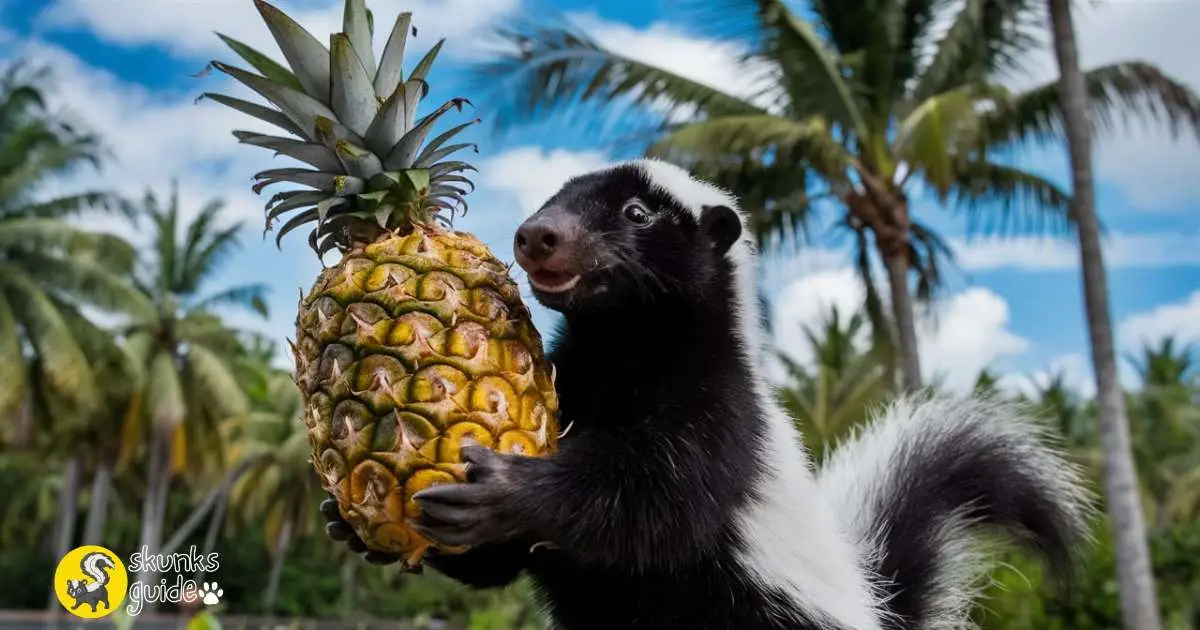Can Skunks Eat Pineapple? Here’s What You Need to Know
Yes, skunks can enjoy pineapple, and from my experience with skunks, I’ve learned it’s a treat they can safely eat—if you’re careful. Pineapple is full of nutrients, but you have to be mindful of its high sugar content. Want to know how to treat your skunk to something sweet without causing any harm? Keep reading to find out how to prepare pineapple the right way for your pet.
The Pineapple Appeal
Pineapples are sweet and juicy. They attract many animals, including skunks. Skunks are curious creatures. Their keen sense of smell leads them to tasty treats. But can skunks eat pineapple safely? Let’s explore.
Nutritional Profile Of Pineapple
Pineapple is not just delicious. It is also packed with nutrients. Here’s a quick look at its nutritional profile:
| Nutrient | Amount per 100g |
|---|---|
| Calories | 50 |
| Carbohydrates | 13g |
| Fiber | 1.4g |
| Sugars | 10g |
| Vitamin C | 47.8mg |
| Manganese | 0.9mg |
Pineapple is low in calories. It contains vitamins and minerals. Vitamin C supports a healthy immune system. Manganese helps with bone health. This makes pineapple appealing to skunks.
Why Pineapple Might Attract Skunks
Skunks are omnivores. They enjoy a variety of foods. Sweet fruits like pineapple are a treat for them. Here are some reasons why skunks love pineapple:
- Sweetness: Skunks enjoy sweet flavors.
- Smell: The aroma of pineapple is strong and enticing.
- Texture: The juicy texture is appealing.
- Variety: Skunks like different food options.
Curiosity drives skunks to explore new tastes. Pineapple’s vibrant color also catches their eye. Skunks may dig through gardens or trash cans for this tasty fruit.
Potential Health Benefits For Skunks
Understanding the health benefits of pineapple for skunks is crucial. Pineapple is not just a tasty treat. It offers various nutrients that can aid skunk health.
Vitamin C And Skunks
Pineapple is rich in Vitamin C. This vitamin plays a vital role in skunk health.
- Boosts the immune system.
- Helps in wound healing.
- Supports healthy skin.
Skunks can benefit from a stronger immune system. A healthy skunk is less likely to get sick.
Digestive Health And Fiber
Pineapple contains dietary fiber. Fiber is important for digestive health.
| Benefits of Fiber | Effects on Skunks |
|---|---|
| Promotes healthy digestion | Reduces constipation |
| Helps maintain a healthy weight | Prevents obesity |
| Supports gut health | Enhances nutrient absorption |
Fiber helps skunks digest their food better. It keeps their digestive system running smoothly.
Risks Of Feeding Pineapple To Skunks
Feeding pineapple to skunks can pose various risks. Skunks have unique dietary needs. Understanding these risks helps keep them healthy.

Sugar Content Concerns
Pineapple contains a high level of sugar. Skunks may not handle sugar well. Here are some key points:
- High sugar can cause obesity.
- Excess sugar leads to diabetes.
- Skunks may develop dental issues.
Moderation is essential. Small amounts may be safe, but too much is harmful.
Acidity And Skunk’s Digestive System
Pineapple is very acidic. This acidity can upset a skunk’s stomach. Key facts about acidity:
- Acidic foods can cause gastritis.
- They may lead to diarrhea.
- Stomach pain can occur after eating.
Skunks have sensitive digestive systems. Introduce new foods slowly. Observe for any negative reactions.
Proper Ways To Introduce Pineapple To Skunks
Pineapple can be a tasty treat for skunks. It’s important to introduce it carefully. Use the right methods to ensure their health. Here are some key guidelines to follow.
Portion Control
Control the amount of pineapple you give. Skunks have small stomachs. Too much pineapple can upset their digestion. Follow these tips for portion control:
- Start with a small piece, about the size of a grape.
- Watch how they react to it.
- Gradually increase the portion if they enjoy it.
Remember, moderation is key. Treat pineapple as an occasional snack, not a meal. This helps maintain a balanced diet.
Frequency Of Feeding Pineapple
Feeding frequency matters. Too often can lead to health issues. Consider these guidelines for frequency:
| Feeding Schedule | Recommended Frequency |
|---|---|
| First Week | Once a week |
| Second Week | Every 5-7 days |
| After Two Weeks | Every 10 days |
Observe your skunk’s health. Adjust the frequency as needed. Always prioritize their well-being. Enjoying pineapple should be a fun experience for them!
Alternative Fruits For Skunks
Finding safe and tasty fruits for skunks is essential. Skunks enjoy various fruits, but some are better choices than others. Let’s explore safe options and fruits to avoid.
Safe Fruit Choices
Here are some safe fruits that skunks can enjoy:
- Apples: Remove the seeds before feeding.
- Bananas: Soft and easy to digest.
- Blueberries: Packed with antioxidants.
- Strawberries: Sweet and juicy treats.
- Mango: A tropical delight; peel first.
- Watermelon: Refreshing and hydrating.
Fruits To Avoid
Some fruits can be harmful to skunks. Avoid these:
| Fruit | Reason to Avoid |
|---|---|
| Avocado | Toxic to many animals. |
| Grapes | Can cause kidney damage. |
| Cherries | Seeds contain cyanide. |
| Citrus Fruits | May upset stomachs. |
Always provide fruits in moderation. Too much can lead to digestive issues. Observe your skunk’s reactions to new fruits. Each skunk is unique and may have different preferences.
Faqs On Skunks And Pineapple
Curious about skunks and their diet? Many people wonder about feeding skunks pineapple. This section answers common questions about skunks and pineapple.

Can Baby Skunks Eat Pineapple?
Baby skunks can eat pineapple, but in moderation. Their digestive systems are sensitive. Here are some key points to consider:
- Age: Only introduce pineapple after weaning.
- Portion Size: A small piece is enough.
- Freshness: Use fresh pineapple, not canned.
- Watch for Reactions: Observe for any digestive issues.
Always consult a vet before changing their diet. Baby skunks need a balanced diet for proper growth.
How To Tell If A Skunk Likes Pineapple
Not sure if your skunk enjoys pineapple? Look for these signs:
- Sniffing: If they sniff the fruit, they might be interested.
- Taste Testing: Watch for them to take a nibble.
- Excitement: Look for playful behavior around the food.
- Finishing the Piece: If they eat it all, they likely enjoy it.
Every skunk is unique. Some might love pineapple, while others may not care for it.
Frequently Asked Questions
What Food Is Poisonous To Skunks?
Foods poisonous to skunks include chocolate, onions, garlic, and avocados. These items can cause serious health issues. Always avoid feeding skunks processed foods or anything high in salt and sugar. Stick to their natural diet to ensure their safety and well-being.
What Fruits Do Skunks Eat?
Skunks enjoy a variety of fruits, including berries, apples, grapes, and melons. They are opportunistic feeders, often foraging for whatever is available. These fruits provide essential nutrients and hydration, making them a favorite among skunks in their natural habitat.
What To Feed Wild Skunks?
Feed wild skunks fruits, vegetables, and insects. They enjoy berries, apples, carrots, and mealworms. Avoid processed foods and dairy. Provide fresh water daily. Ensure food is safe and natural to support their health. Remember, it’s best to let them forage for their own food whenever possible.
Conclusion
Skunks can eat pineapple, but it should be in moderation. This fruit provides vitamins and hydration, making it a tasty treat. Always ensure the pineapple is fresh and cut into small pieces. Monitoring your skunk’s diet is essential for their health.

